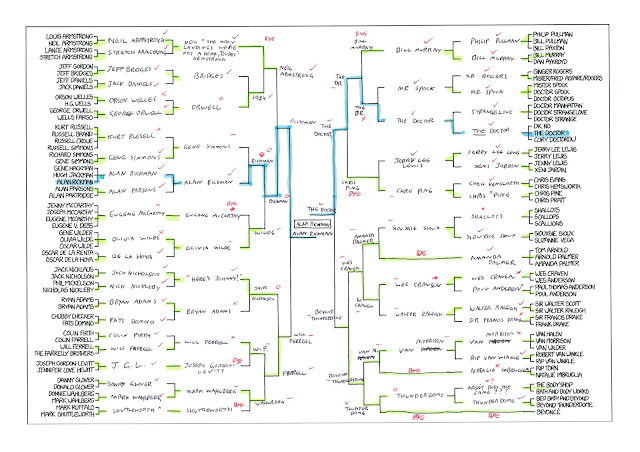Nevertheless, I have been encouraged to maintain an at least
nominal output. I’m not planning anything drastic like actually tallying up my
results and updating my counters just yet, though.
Some time back, Randle Munroe posted this bracket on his web
comic XKCD. It’s not exactly enraged-bobcat-in-a-box slapstick, but it’s
there. Now normally I don’t dabble in bracket construction; I have people to do
that
sort of thing for me. But then #xkcdbracket
came along and made the whole thing psephological.
If you haven’t been playing along at home, the idea is
simple – people vote, winner progresses. In reality, the whole exercise has
been confounded by vote rigging,
trash-talking
and botanical
classificatory disagreement. Some people might argue that a vote with no
context or impact is meaningless. People like @xkcdbracket,
for example. However, this is actually quite meaningful in that it eliminates a
whole bunch of unquantifiable variables from normal elections (such as policy
communication or making a choice that could shape several years of the nation’s
politics and day-to-day life) and allowing us to analyse popularity and voting
patterns in a relatively controlled environment.
The first vote for the preliminary finals is now open, which is a
good time to start with some data under out belt and some excitement still to
follow.
Here is my initial suspicions, based on my assumptions about
the likes and interests of the standard XKCD audience:
A more repeatable approach, however, is as follows: all
initial pairings (or three- or four-cornered contests) were decided based on
the number of google hits for each name. Fred Astaire was used as the search
term for Mr Rogers, Gordon-Levitt was hyphenated (does that make a difference?)
and Beyoncé was spelt without the accent. Live with it.
After that, Google Fight was used to determine the
individual with the most exposure on the internet. I was looking forward to
watching a stick-figure of Ginger Rogers laying into a stick-figure Doc Ock,
but apparently Google Fight was overhauled some time since I was a young
teenager and now you just get a boring graph.
This provides some very different results. For example, commercial
ventures pay a lot of money on advertising which is why Wells Fargo and the
cinematic juggernaut Dr. No made it to the finals, narrowly squeezing out The
Body Shop.
I also see the potential for what I might call the Bieber
effect but, in accordance with the Bieber effect, decide the name Kardashian
effect is microscopically less off-putting. Basically, the idea that a person’s
popularity on the internet does not equate to popularity – especially if they
exist largely as the butt of jokes of subjects of complaint. Thus, while Justin
Bieber may score very highly in a google-fight against the
guy Neil Armstrong sued for the return of his hair, but we all know who’d
win in an internet voting contest.
Nonetheless, that method gives these results:
Meanwhile, the actual progress into the preliminary finals so far
is:
(Since the Doctor was taken out by Mr Spock (How did I ever imagine Whovians would outnumber Trekkies?) by unofficial prediction is Rickman v Spock in the Final)
How to Fight the Internet (and Win):
(Added 23/7/2015)So, this is how the two methods did in the preliminary rounds:


Ticks represent correct predictions, crosses wrong ones. After the first tier, dashes indicate wrong answers resulting from a matchup that never occurred (i.e. influenced by earlier errors) while circles indicate that a correct prediction was made despite earlier errors.
Round 1
PsephologyKid: √:31 X:13 TOSSUP: 1
The Internet: √:17 X:28
Round 2
PsephologyKid: √: 8 X: 2 O: 2 -: 8
The Internet: √: 1 X: 1 O: 2 -:16
Round 3
PsephologyKid: √: 1 X: 2 O: 2 -: 7
The Internet: √: 0 X: 0 O: 0 -:12
Round 4
PsephologyKid: √: 1 X: 0 O: 1 -: 4
The Internet: √: 0 X: 0 O: 0 -: 6
TOTAL
PsephologyKid: √:41 X:17 O: 5 -:19 TOSSUP: 1
The Internet: √:18 X:29 O: 2 -:34
So, my method (or "hunch") had consistently more right answers and fewer wrong answers. Despite the fewer errors, my method also had more corrections ("O"s), probably helped by having more brackets with viable (tick or "O" candidates) and, obviously, fewer dashes.
My hunch also got one correct nomination into the preliminary finals (unfortunately we now know that Alan Rickman has been knocked out.) This doesn't help us develop a reliable predictive tool, but it DOES quite conclusively illustrate that internet popularity is not very useful to the predictive psephologist. (Sorry Wells Fargo.)


